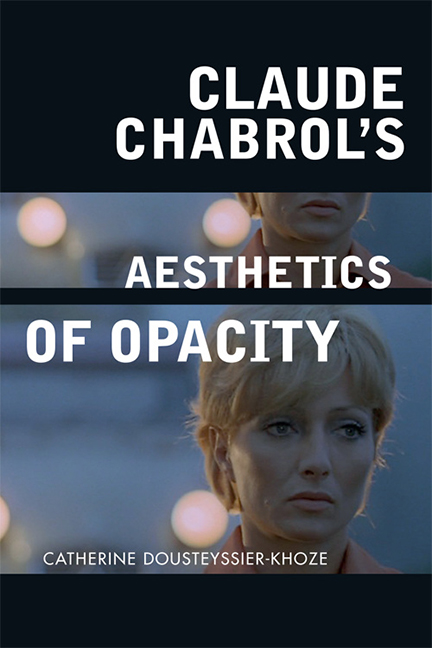Book contents
- Frontmatter
- Contents
- List of Figures
- Acknowledgements
- Dedication
- Introduction
- 1 Contexts and Influences
- 2 Chabrol and Genres
- 3 The Human Beast
- 4 Family Secrets
- 5 Chabrolean Spaces as Heterotopias of Crisis
- 6 Through the Looking Glass: Chabrol’s Mirrors and the ‘Crystal-image’
- Conclusion: Towards an Aesthetics of Visual Opacity
- Filmography
- Bibliography
- Index
1 - Contexts and Influences
Published online by Cambridge University Press: 10 November 2020
- Frontmatter
- Contents
- List of Figures
- Acknowledgements
- Dedication
- Introduction
- 1 Contexts and Influences
- 2 Chabrol and Genres
- 3 The Human Beast
- 4 Family Secrets
- 5 Chabrolean Spaces as Heterotopias of Crisis
- 6 Through the Looking Glass: Chabrol’s Mirrors and the ‘Crystal-image’
- Conclusion: Towards an Aesthetics of Visual Opacity
- Filmography
- Bibliography
- Index
Summary
In a career spanning more than half a century, Chabrol directed fifty-four full-length films, an output that is generally considered to be very uneven, ranging from highly acclaimed films such as Le Boucher/The Butcher (1969) or La Cérémonie/Judgement in Stone (1995) to dated flops (see, for instance, the make-to-order spoofs of the 1960s such as Marie-Chantal contre Dr Kha [1965]) that were made when he needed funds and had no choice but to take on such projects. Chabrol is well known, and often criticised, for his pragmatic approach to cinema, his compromise between commercial and aesthetic considerations. In one extreme case, he even agreed to make a film (L’Œil du malin [1961]) with only half of the original budget. He saw himself as an ‘artisan’ (‘craftsperson’) rather than as an artist. Hence, perhaps, his hybrid status as a popular director in France and abroad but one who is decidedly underrated.
In an editorial entitled ‘Chabrol méconnu’ published in Cahiers du cinéma right after Chabrol's death in 2010, Stéphane Delorme summarises the situation as follows:
[La] mort de Chabrol touche largement, tant des films comme Le Boucher, Que la bête meure ou La Cérémonie, furent immensément populaires. Pour autant, son statut de grand cinéaste n’est pas autant assuré auprès des cinéphiles que celui de Godard, Rohmer, Rivette ou Truffaut. Les raisons sont multiples: trop de films réalisés, trop de films importants invisibles, trop de films populaires que l’on croit connaître, à tort. Les éloges de toutes parts ont même un peu vite transformé Chabrol en bon oncle sympathique mijotant plus ou moins toujours la même recette. Quelle recette? Le portrait de la bourgeoisie, servie au choix en gelée, en fricassée ou en pâté.
(Chabrol's death is of concern to many given that films such as Le Boucher, Que la bête meure or La Cérémonie were immensely popular. However, his status as a great director is not as firmly established with film specialists as Godard’s, Rohmer’s, Rivette's or Truffaut’s. There are multiple reasons to this: too many films; too many important films that are invisible; too many popular films that one is convinced of knowing, and wrongly so. The various praises have only too quickly turned Chabrol into a pleasant old uncle, who has but one recipe in his cooking repertoire. What recipe? The portrayal of the bourgeoisie, served either in aspic, fried or as a pâté.)
- Type
- Chapter
- Information
- Claude Chabrol's Aesthetics of Opacity , pp. 6 - 42Publisher: Edinburgh University PressPrint publication year: 2017



